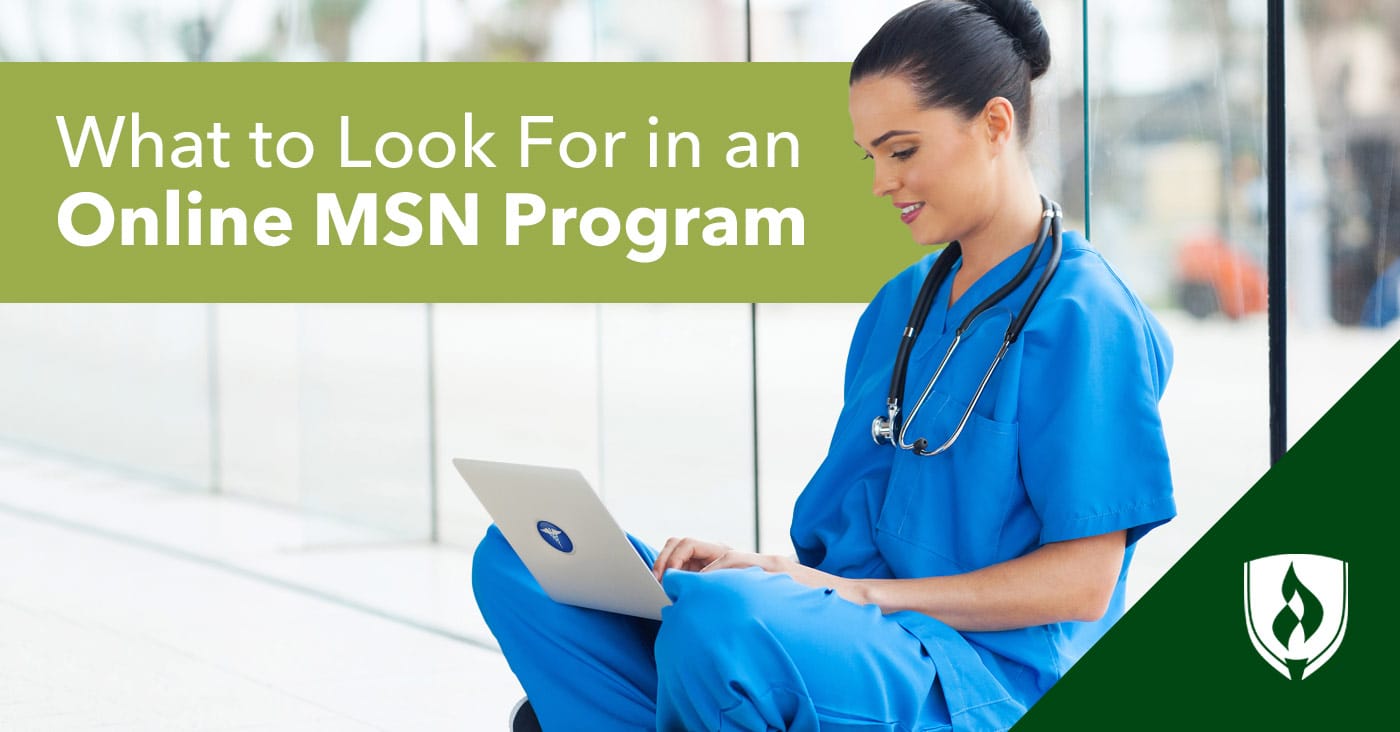What to Look For in an Online MSN Program
By Will Erstad on 08/12/2019

As an established nurse, you already have a great understanding of how undergraduate nursing programs work and know what to look for when evaluating. You could give plenty of sound advice to friends or family on that front.
But when it comes to a Master of Science in Nursing (MSN) program, particularly an online MSN program, you might not be feeling as confident. Will I have clinical hours to satisfy? Can I continue to work while in school? Will the course load be overwhelming? How does it all work?
We’re here to help clear up some of the confusion and provide you a road map of things to consider when evaluating online MSN programs. Keep reading for the info you’re seeking.
How do online MSN programs work?
You’ve obviously got a lot on your plate already and nursing shift schedules aren’t always easy to work around. So how does an online MSN program make this work? While the details will vary depending on the program, online programs typically provide flexibility by making course resources available at any time. This means in most cases you won’t need to be at your computer at a set time during the week to take in lectures or other important materials.
That doesn’t mean the experience is without structure—students in online MSN programs may have regular weekly assignments or projects with deadlines to meet. You just have a little more freedom around when you tackle the required work.
6 smart questions to ask when evaluating online MSN programs
There’s a lot to weigh when trying to determine whether an online Master of Science in Nursing program is a good fit for you. Here are a few focus areas you may want to consider.
1. Is the program accredited?
Simply put, accreditation matters. It’s an important source of third-party validation of the quality of a program and can be an important factor for state licensure. Before you enroll, you’ll want to take the time to confirm a program’s accreditation status and determine whether it meets your needs.
Two of the programmatic accrediting bodies for nursing are the Commission on Collegiate Nursing Education (CCNE) and the Accreditation Commission for Education in Nursing (ACEN). If you’re unsure of a program, both offer the ability to verify an institution’s accreditation status.
2. What roles will this program prepare me for?
Another important factor to consider before enrolling in an online MSN program is determining whether the program is tailored to the outcome you’re seeking. Some graduate-level nursing programs cater to hands-on roles like those of Advanced Practice Registered Nurses (APRNs). Others focus more on preparing students for leadership or education roles.
Types of APRNs include certified nurse practitioners, clinical nurse specialists, certified registered nurse anesthetists and certified nurse midwives. These programs typically include additional clinical work performed under the supervision of established APRNs.
Outside of advanced practice registered nursing, MSN programs can also be designed for students seeking leadership roles within nursing administration or a role as a nurse educator. Once you have a clear picture of the graduate-level nursing outcome you’re seeking, it will be easier to narrow down your online MSN program options.
3. How will my schedule be structured?
You might think there’s limited room for variation on this front, but there are important factors that can influence the course schedule of an online MSN program. Is the school on a quarterly system? Or does it adhere to traditional spring and fall semesters? Are all courses available over the summer—and are spots limited during this time? The answer to these questions can have a surprising impact on your learning experience.
Another scheduling factor to consider includes the course format. The Rasmussen University Master of Science in Nursing program is offered in an innovative competency-based education format that can provide for a lot of flexibility. From day one of the course, you’ll have everything you’ll need to complete your work before the end of the term. As long as you finish your assignments prior to the end of the course term, you control your deadlines and set the pace as needed—no more sweating an arbitrary weekly deadline if you’re having an unexpectedly busy week.
4. What should I expect for practicum experiences?
You’ve been around the block and know firsthand how big of a role in-person lab work and clinical experience can play in a nurse’s education. While the in-person requirements of an MSN program will take on a different form from what you’ve experienced in previous nursing school stops, the fundamental goal of applying what you’ve learned to a real world setting will remain.
The Master of Science in Nursing program at Rasmussen University includes two practicum experiences for students where they’ll have meaningful opportunities to apply their advanced nursing skills to both direct and indirect patient care settings. These practicum experiences are completed within your own community under the supervision of a master’s degree-prepared nurse preceptor.
5. What requirements do I need to meet to be accepted?
A program that appears to be a perfect fit doesn’t do you a lot of good if you aren’t able to meet the requirements for admission. As you begin comparing programs and options, you’ll want to have a clear understanding of what requirements must be met.
Typically, a Master of Science in Nursing program will require students to meet several criteria. Some may be pretty obvious, like first earning a Bachelor of Science in Nursing degree and possessing an active and unencumbered RN license. But other requirements like writing samples, CPR certifications, letters of reference and minimum grade point averages could throw a wrench in your plans if you’re not prepared.
6. How long will the program take to complete?
Even the most enthusiastic students don’t typically want to spend any more time than necessary to complete their degree program—and that doesn’t become any less true when combined with a nursing work schedule. Even if this isn’t your top concern (after all, earning an MSN is going to be a time investment no matter where you attend), this is a topic worth inquiring about as it’ll help you plan ahead.
Most programs will take around two years to complete if all goes to plan, but there are programs that may provide a faster route to completion. The Rasmussen University online MSN program, for instance, can be completed in as a few as 18 months, allowing you a streamlined path for moving on to the next phase of your nursing career sooner.1
Start your search for an online MSN program
Committing to a graduate nursing education program is a big step with plenty to consider. This article should give you a great starting point for weighing your options. Take some time to evaluate your priorities and needs before starting your search. If you’re ready to get this process started, visit the Rasmussen University Master of Science in Nursing degree page—this flexible, CCNE-accredited program just might be the perfect fit for you!
1Completion time is dependent on the number of courses completed each term.
The Master of Science in Nursing degree program at Rasmussen University is accredited by the Commission on Collegiate Nursing Education l 655 K Street NW, Suite 750 l Washington, DC 20001 l 202-887-6791




